If you’re seeking parenting books that truly change how you connect and raise your kids, I recommend starting with titles like *How You’re You*, *Raising Good Humans*, *The Whole-Brain Child*, and *Good Inside*. These focus on emotional intelligence, mindfulness, and respectful communication. They offer practical strategies for managing behaviors, building resilience, and fostering confidence. Keep exploring these resources—if you stick with it, you’ll uncover even more ideas to support your family journey.
Key Takeaways
- The list includes books emphasizing emotional intelligence, mindfulness, and respectful communication for transformative parenting approaches.
- Resources like *Raising Good Humans* and *Good Inside* focus on fostering kindness, resilience, and understanding children’s inherent goodness.
- Practical guides such as *How to Talk So Kids Will Listen* and *The Whole-Brain Child* offer effective strategies for managing behavior and emotional growth.
- Specialized books like *How You’re You* and *The Simplest Baby Book in the World* support honest family origins discussions and new parent guidance.
- The selection prioritizes nurturing relationships, reducing stress, and promoting long-term emotional health in children.
How Youre You
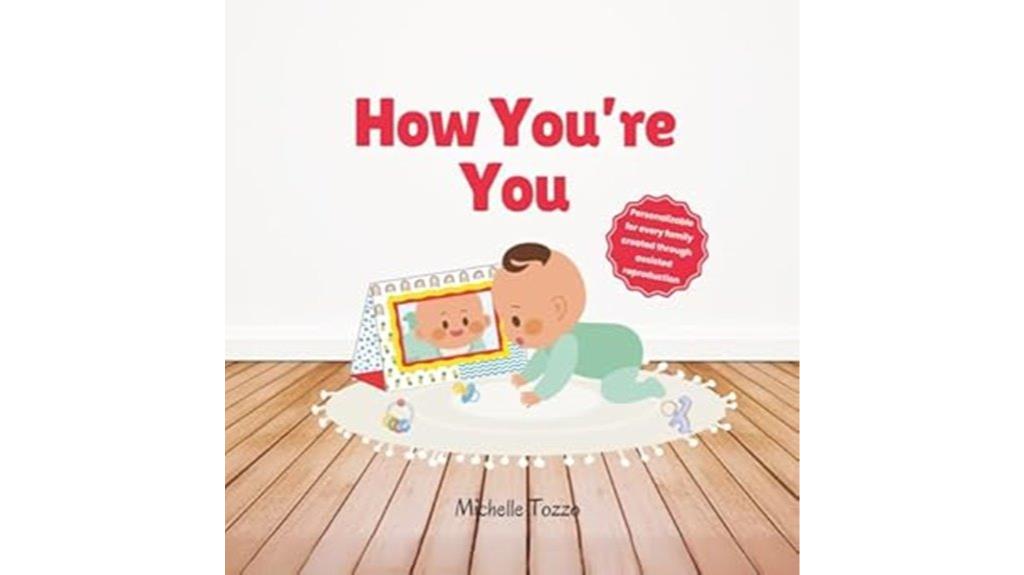
Are you looking for a gentle way to explain to your young child that they are uniquely their own person? “How You’re You” is the perfect parenting book for families steering through nontraditional conception stories, like donor sperm or surrogacy. It offers an age-appropriate, honest, and loving explanation of a child’s origins. With charming illustrations and rhyming text, it makes complex topics accessible and engaging for toddlers. I’ve found it invaluable for fostering open conversations, helping children feel proud of their unique story. This book encourages honesty while celebrating love, making it easier for parents to share important family details naturally and confidently.
Best For: families seeking a gentle, age-appropriate way to explain nontraditional conception stories to young children and toddlers.
Pros:
- Uses charming illustrations and rhyming text to engage young children and make complex topics accessible.
- Promotes honesty and love, helping families foster open and natural conversations about family origins.
- Supports ongoing use as children grow, making it a long-lasting resource for family storytelling.
Cons:
- May require parents to personalize or expand on the story for more detailed explanations as children age.
- The simplicity might not cover all specific family situations or cultural nuances.
- Some parents might prefer more detailed or scientific explanations for older children.
Raising Good Humans: A Mindful Guide to Parenting
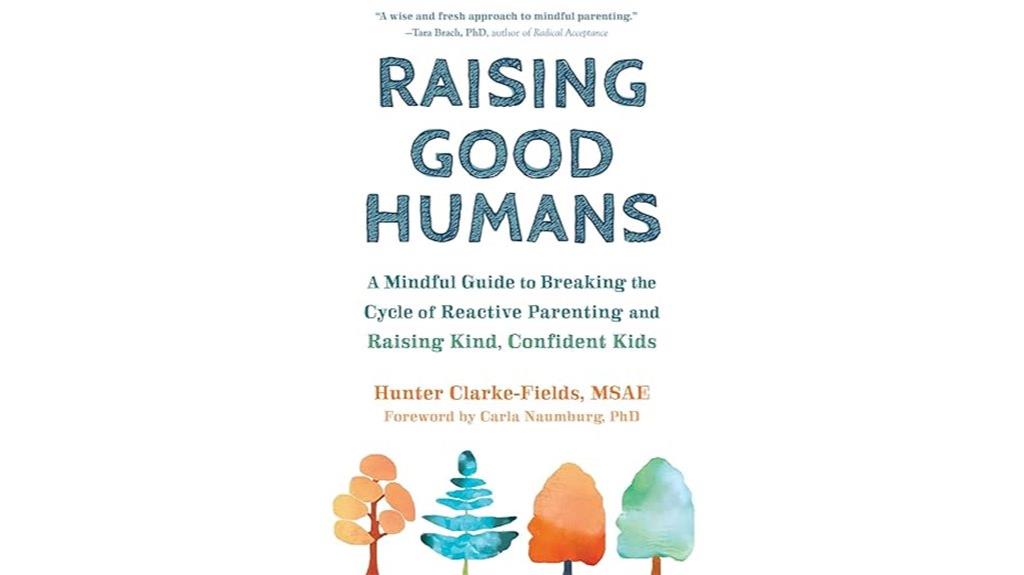
If you’re seeking a parenting resource that emphasizes kindness, emotional intelligence, and mindful communication, *Raising Good Humans: A Mindful Guide to Parenting* is an excellent choice. This book focuses on nurturing empathy, resilience, and compassion in children while encouraging parents to model positive behavior. It offers practical strategies, like creating safe emotional spaces and managing tough situations with calmness. I found it inspiring for its gentle approach, promoting self-awareness and personal growth. Many readers, including myself, experience a shift in their parenting style—moving toward patience, reflection, and connection. It’s a thoughtful, accessible guide that truly helps raise confident, emotionally healthy kids.
Best For: parents, caregivers, and anyone interested in mindful, compassionate parenting who want to foster emotional intelligence and resilience in children.
Pros:
- Offers practical, real-life strategies for nurturing kindness and empathy in children.
- Emphasizes self-awareness and personal growth for parents, leading to more mindful parenting.
- Accessible, warm, and encouraging tone that resonates with both new and experienced parents.
Cons:
- Not a quick fix; requires ongoing effort and self-work for meaningful results.
- Some readers may find it less suited for those looking for highly structured or traditional parenting advice.
- The focus on gentle, mindful parenting may not address all behavioral challenges or immediate issues.
Raising Good Humans: A Mindful Guide to Parenting
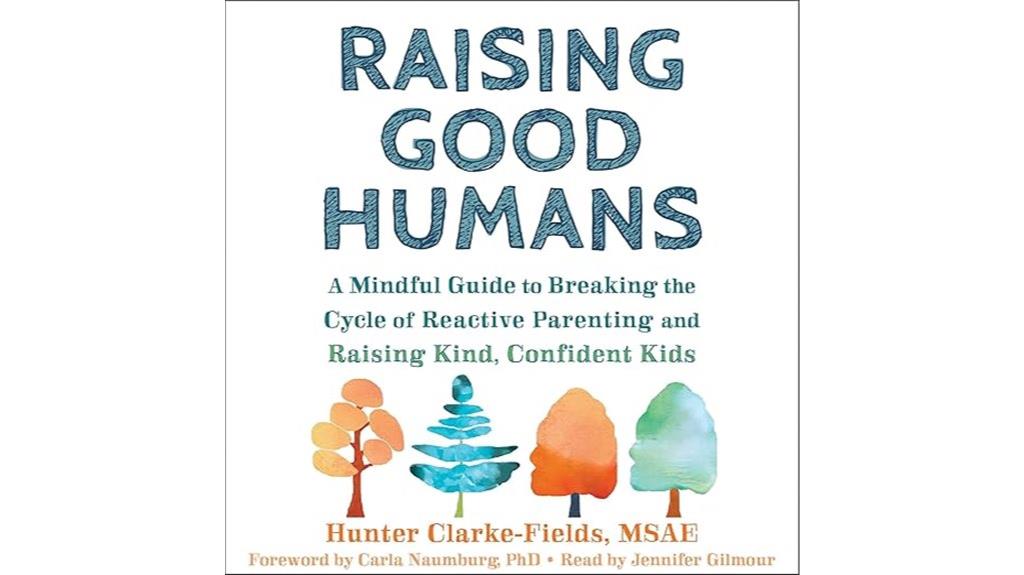
Parents seeking a compassionate, practical guide to raising emotionally intelligent children will find “Raising Good Humans: A Mindful Guide to Parenting” especially valuable. This book emphasizes modeling kindness, creating safe spaces for emotional expression, and practicing empathy. I appreciate how it balances gentle parenting principles with actionable strategies, acknowledging that no parent’s perfect. It encourages self-reflection, reminding us that personal growth directly impacts our kids. The focus on managing emotions and self-care resonates deeply—I’ve learned to stay calm during tough moments, fostering stronger connections. Many readers, including myself, have experienced greater patience and understanding, making this book a transformative resource for mindful, compassionate parenting.
Best For: parents and caregivers seeking a compassionate, practical, and mindful approach to nurturing emotionally intelligent and kind children.
Pros:
- Offers clear, relatable examples and practical strategies for everyday parenting situations
- Emphasizes self-reflection and personal growth as key to improving children’s behavior
- Promotes a calm, empathetic, and connected parenting style that fosters emotional resilience
Cons:
- May require ongoing self-work and patience, which can be challenging during stressful times
- Some readers might find the gentle approach less directive for immediate behavior management
- The focus on internal growth might be less appealing for parents looking for quick fixes or traditional disciplinary methods
The Whole-Brain Child Book
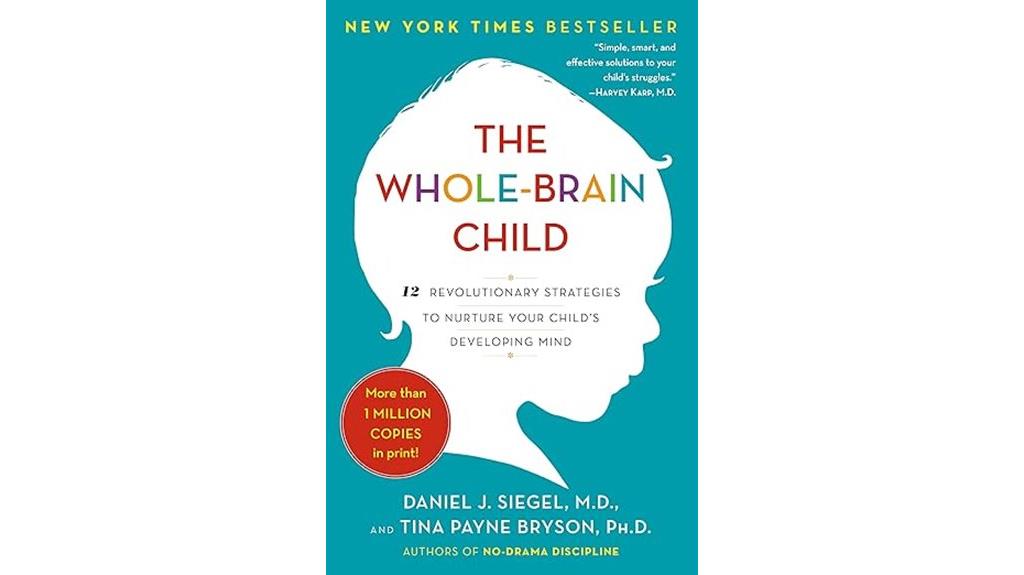
The Whole-Brain Child Book stands out as an ideal resource for anyone involved in raising or caring for children who seeks practical, science-based strategies grounded in neuroscience. It simplifies complex brain science into relatable techniques like “name it to tame it” and “connect and redirect,” which help reduce tantrums and build emotional bonds. The book emphasizes using everyday moments—stressful or joyful—as opportunities for growth, making it highly practical. By understanding how different parts of the brain work together, parents and caregivers can foster emotional regulation, resilience, and stronger relationships, all while confidently steering children’s behaviors and development.
Best For: parents, teachers, and caregivers seeking practical, science-based strategies to support children’s emotional development and strengthen their relationships.
Pros:
- Simplifies complex neuroscience into easy-to-understand techniques that can be applied daily.
- Focuses on using everyday interactions as opportunities for growth and emotional learning.
- Offers practical tools and strategies that foster emotional regulation, resilience, and stronger bonds.
Cons:
- Examples primarily address typical middle-class children, with limited guidance for complex or traumatic issues.
- Some strategies require significant effort and consistency, which may be challenging for busy caregivers.
- Certain scientific claims, especially about implicit memories, might invite skepticism or require further research.
Good Inside: A Guide to Becoming the Parent You Want to Be
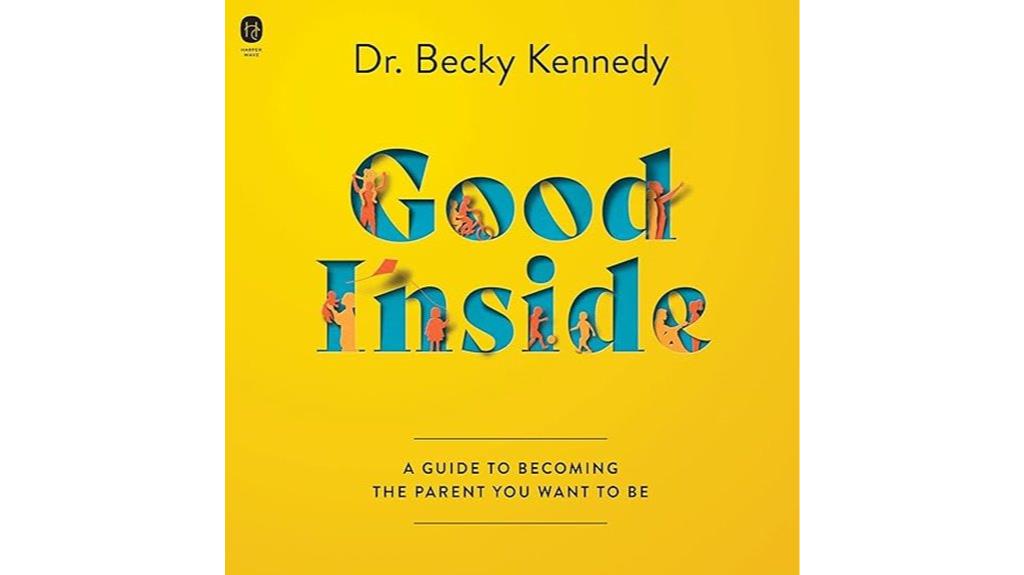
“Good Inside: A Guide to Becoming the Parent You Want to Be” stands out as an essential resource for those seeking a compassionate and respectful approach to parenting. I found it incredibly practical and inspiring, offering real strategies to improve reactions and foster emotional connection. The book emphasizes that children are inherently good inside and that challenging behaviors signal unmet needs, not badness. It encourages validating emotions, setting boundaries confidently, and reflecting on our own upbringing. This approach transformed my perspective, helping me respond with empathy rather than punishment. It’s a powerful, life-changing guide that promotes kindness, emotional intelligence, and genuine connection in parenting.
Best For: parents, educators, and caregivers seeking a compassionate, respectful, and practical approach to raising emotionally intelligent children.
Pros:
- Offers actionable, real strategies that promote empathy and emotional regulation
- Emphasizes respect, kindness, and understanding over punishment
- Transforms perspectives on behavior, fostering stronger emotional connections
Cons:
- May require a mindset shift for those used to traditional disciplinary methods
- Some readers might find the concepts challenging to implement consistently
- Focuses primarily on emotional understanding, which may need to be supplemented with other parenting techniques in certain situations
How to Talk So Kids Will Listen & Listen So Kids Will Talk Book
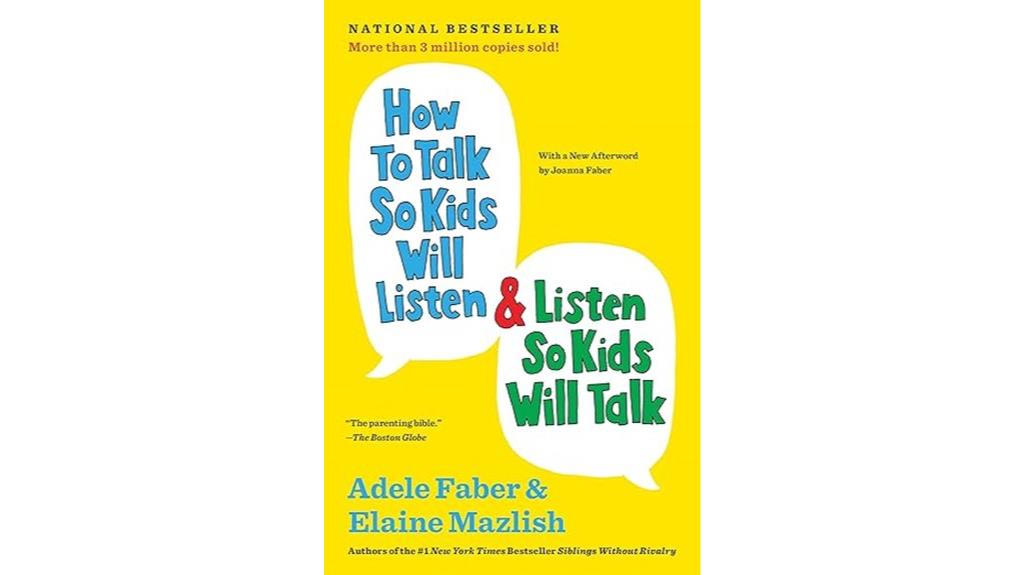
If you’re looking for a parenting book that genuinely improves communication with children, *How to Talk So Kids Will Listen & Listen So Kids Will Talk* is an excellent choice. It offers practical strategies rooted in respect and empathy, helping parents listen more effectively and respond thoughtfully. The book emphasizes acknowledging feelings, sharing emotions, and building mutual respect, rather than relying on punishment. Many readers find that applying these techniques reduces stress, enhances cooperation, and strengthens relationships. With accessible explanations, real-life examples, and engaging formats, this book transforms parenting conversations, making them more meaningful and less confrontational. It truly helps foster understanding and emotional growth in children.
Best For: parents, caregivers, teachers, and professionals seeking practical, respectful communication strategies to improve relationships and foster emotional growth with children.
Pros:
- Provides practical, easy-to-understand techniques grounded in empathy and respect
- Includes numerous real-life examples and illustrations for better understanding
- Widely praised for its positive impact on parent-child relationships and cooperation
Cons:
- Some techniques may require time and patience to see significant results
- Not all methods are suitable for every child or situation, requiring adaptation
- The book’s focus on respectful communication might be challenging for readers accustomed to traditional discipline practices
Practical Guide to Calm Parenting
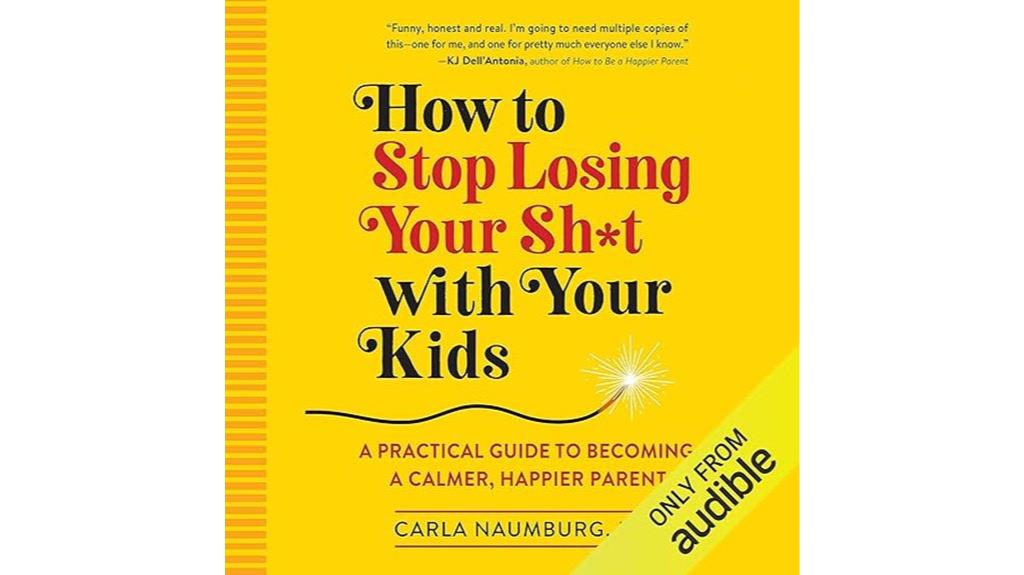
Are you a parent feeling overwhelmed by daily stresses and occasional outbursts? This book emphasizes managing your reactions instead of controlling your child’s behavior. It encourages waiting until you’re calm before addressing issues, fostering mindfulness and self-awareness. The strategies are simple, practical, and mostly free, helping you handle minor meltdowns and intense temper moments more effectively. You’ll learn that controlling your responses, not your child’s actions, improves discipline and strengthens your bond. Personal stories and humor make the advice relatable and encouraging, reminding you that everyone, including professionals, struggles at times. It’s a reassuring guide to building patience and emotional resilience.
Best For: parents seeking practical, accessible strategies to manage stress, improve patience, and foster healthier relationships with their children.
Pros:
- Emphasizes parent self-regulation and mindfulness, promoting emotional resilience
- Provides simple, practical, and mostly free strategies that can be applied immediately
- Uses relatable stories and humor to make challenging parenting moments easier to handle
Cons:
- Some readers find the advice repetitive and the tone less engaging over time
- The humor and language may not resonate with everyone and could feel disrespectful to children
- The beginning can be discouraging by emphasizing the rarity of losing control, which might induce guilt
The Simplest Baby Book in the World
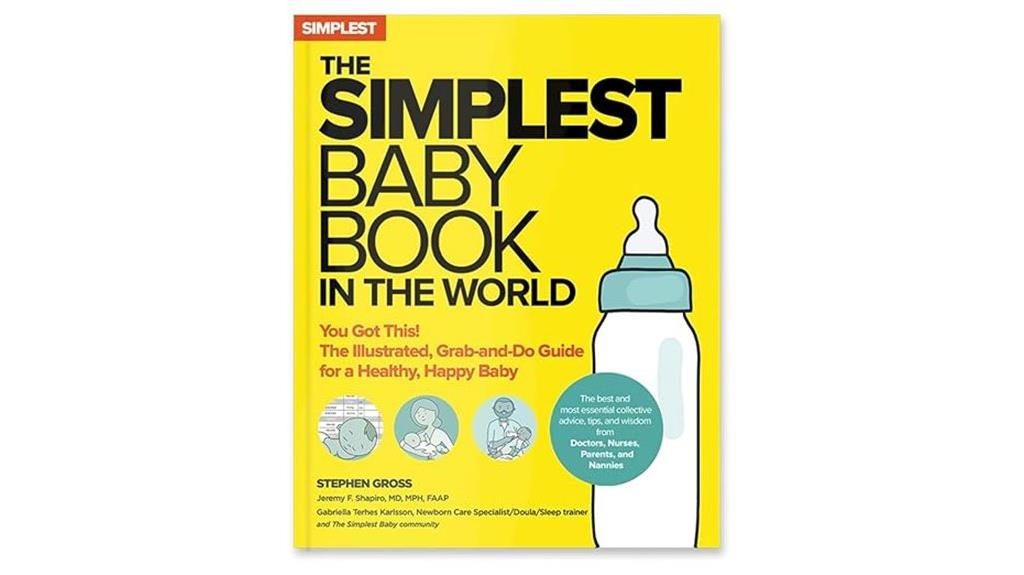
The Simplest Baby Book in the World stands out as the perfect choice for first-time parents who want clear, straightforward guidance without feeling overwhelmed. It’s praised for its simplicity, with large print, illustrations, and diagrams that make complex topics easy to understand. The book covers essential newborn care, feeding, sleep, and motherhood tips, offering high-level advice that’s quick to read and easy to revisit. Many parents find it reassuring and practical, especially during pregnancy and early postpartum. While it’s tailored to American standards and has some minor errors, its visual approach and concise content make it a valuable, accessible resource for new parents seeking confidence and clarity.
Best For: First-time parents seeking a clear, simple, and visual guide to newborn care, feeding, and sleep routines.
Pros:
- Easy to understand with large print, illustrations, and diagrams enhancing readability
- Concise and straightforward, making it quick to read and revisit during pregnancy and postpartum
- Provides practical, high-level advice suitable for beginners feeling overwhelmed by more detailed texts
Cons:
- Primarily tailored to American standards, which may limit applicability in other cultural contexts
- Contains some printing errors and schedules that are considered overly simplistic or less detailed for practical use
- Lacks in-depth customization and detailed guidance for specific developmental stages or cultural practices
Parenting and Anger Management Guide
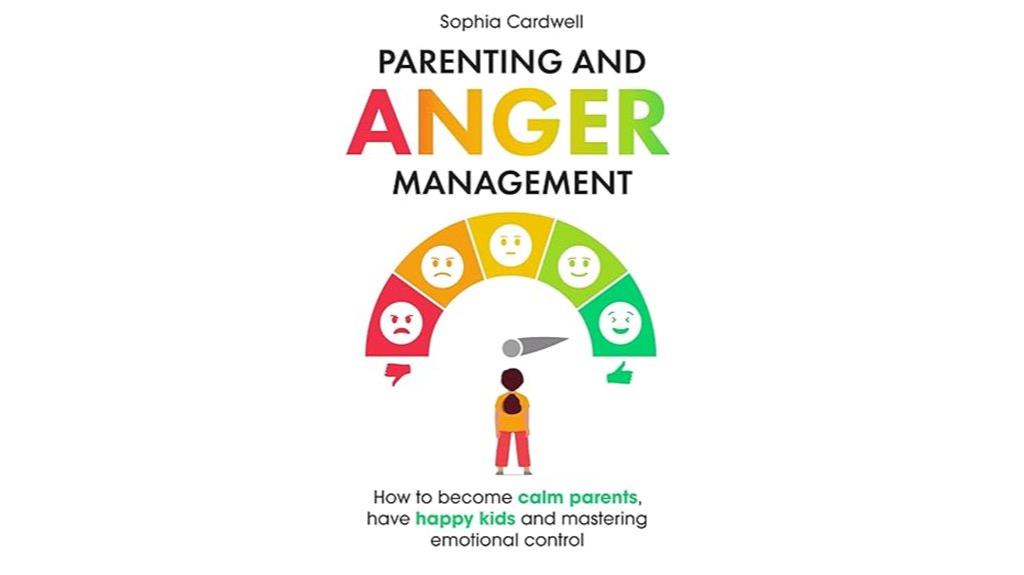
Parents seeking practical, empathetic guidance on managing their anger will find the “Parenting and Anger Management Guide” especially valuable. This book helps you identify triggers, practice mindfulness, and develop de-escalation techniques to stay calmer during difficult moments. It emphasizes creating nurturing relationships, improving communication, and modeling emotional regulation for your children. Through relatable stories and real-life examples, it reassures you that you’re not alone in your struggles. Implementing its strategies reduces household stress, strengthens bonds, and fosters healthier family dynamics. Ultimately, it encourages self-compassion and patience, transforming parenting challenges into opportunities for growth and joy.
Best For: Parents, caregivers, and family members seeking practical, compassionate strategies to manage anger, improve communication, and foster healthier, more nurturing relationships with children.
Pros:
- Offers easy-to-understand, actionable techniques for managing parental anger and stress.
- Includes relatable stories and real-life examples that validate parents’ experiences.
- Focuses on long-term family well-being through fostering patience, self-compassion, and emotional regulation.
Cons:
- May require consistent practice and patience to see significant behavioral changes.
- Some strategies might need adaptation for specific family dynamics or individual needs.
- The book might not provide in-depth clinical or therapeutic tools for severe anger issues.
Moms on Call | Basic Baby Care 0-6 Months | Parenting Book 1 of 3
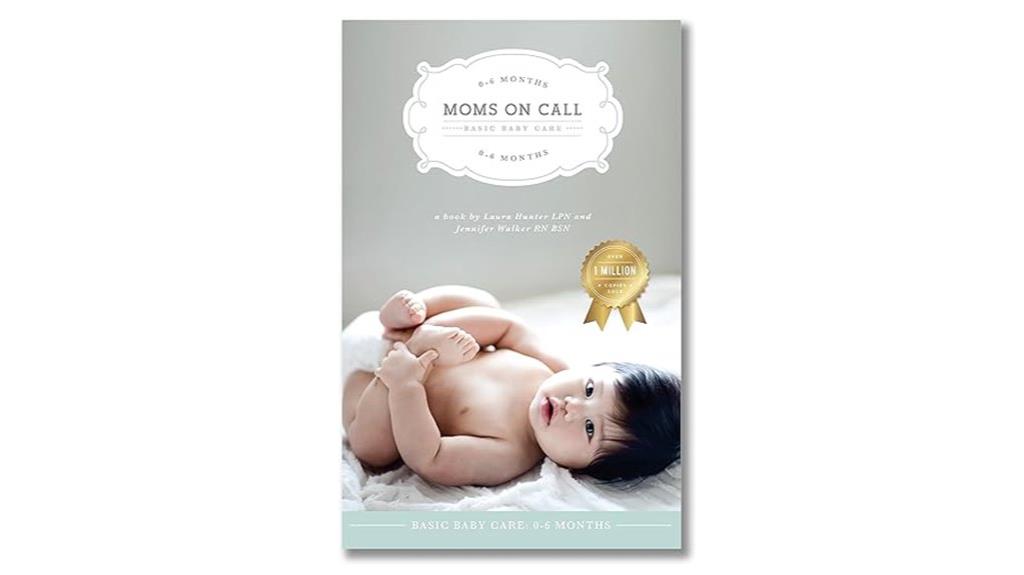
If you’re looking for a straightforward, practical guide to help manage your baby’s first six months, Moms on Call is an excellent choice. I found it incredibly helpful for establishing simple, effective routines that promote healthy sleep and development. The book offers clear, actionable advice on sleep training, feeding, and daily habits, which many parents report leads to babies sleeping through the night as early as 7 weeks. Its flexible approach allows for adjustments based on your family’s needs, making routines easier to stick with. Overall, it’s a practical manual that reduces stress, improves sleep, and helps new parents feel more confident during those early, often overwhelming months.
Best For: new parents seeking a practical, flexible, and straightforward guide to establish routines for their baby’s first six months to promote healthy sleep and development.
Pros:
- Offers clear, actionable advice that simplifies newborn care and routine establishment
- Highly recommended for promoting consistent sleep patterns, often leading to babies sleeping through the night as early as 7 weeks
- Adaptable routines that can be customized to fit family schedules, travel, and individual needs
Cons:
- Some parents may find the emphasis on structured routines and sleep training to be too rigid or not suitable for their parenting style
- The book has been critiqued for promoting cry-it-out methods, which may not align with all parents’ philosophies
- Requires commitment and consistency, which can be challenging for families with unpredictable schedules or less available time
Talk, Don’t Yell Book on Mindful Parenting and Discipline
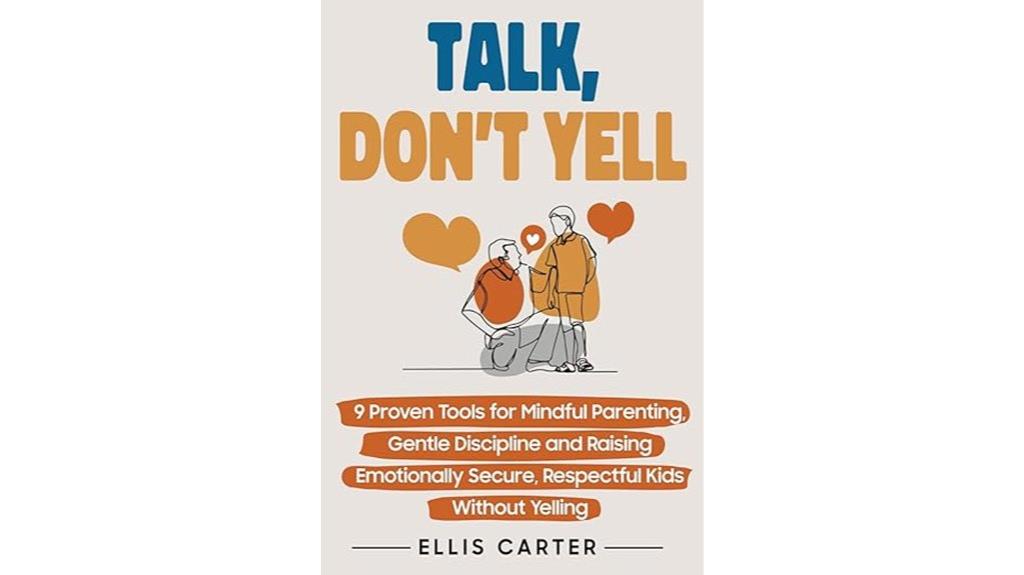
For anyone seeking a calmer, more respectful approach to discipline, Talk, Don’t Yell offers practical tools grounded in mindfulness and emotional connection. The book presents nine proven strategies to replace yelling with calm, effective communication, like boundary-setting, repair rituals, and tailored scripts for different ages. Techniques such as mindful routines, breathing cues, and “pause-before-reply” help manage chaos and reduce power struggles. Emphasizing empathy and active listening, the approach nurtures trust and emotional security. It also stresses parents’ self-regulation, encouraging mindfulness and patience. Overall, these easy-to-implement tools foster cooperation, respect, and deeper bonds, even during challenging moments.
Best For: parents and caregivers seeking practical, mindful, and respectful strategies to foster emotional connection and reduce conflict with children of all ages.
Pros:
- Offers nine proven tools grounded in developmental psychology for effective discipline without yelling.
- Emphasizes emotional connection, empathy, and active listening to build trust and security.
- Provides easy-to-implement strategies like routines, scripts, and repair rituals that improve household harmony.
Cons:
- May require a mindset shift and consistent practice, which could be challenging for some parents.
- The book’s focus on mindfulness and emotional regulation might be less applicable in highly chaotic environments without additional support.
- Some strategies may need adaptation for specific cultural or family dynamics not explicitly addressed in the book.
Raising Mentally Strong Kids: Neuroscience, Love, and Logic
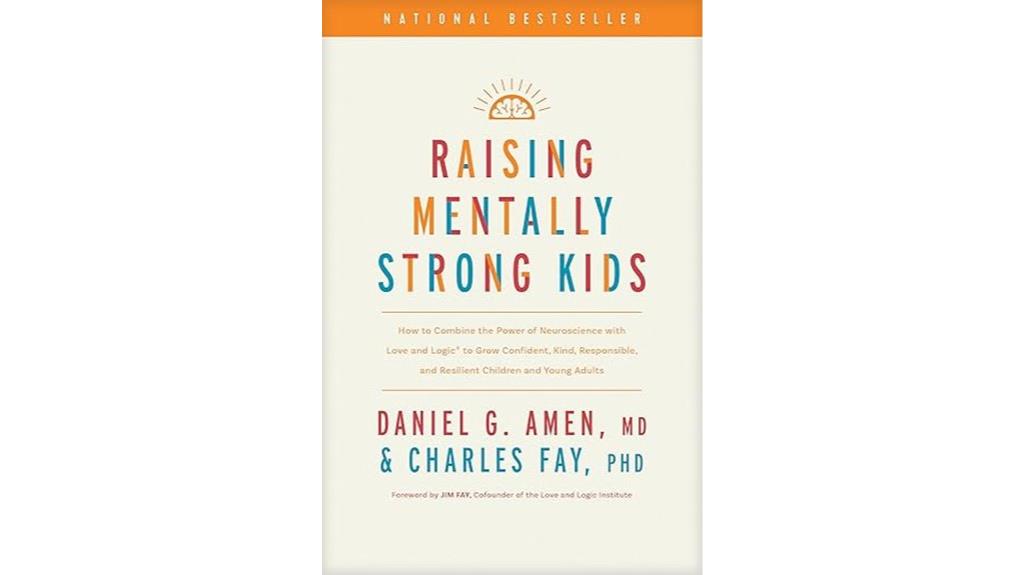
Raising Mentally Strong Kids stands out as an essential resource for anyone involved in a child’s development—whether you’re a parent, educator, or caregiver—because it combines the latest neuroscience with practical strategies for nurturing resilience. Dr. Daniel Amen explains how understanding a child’s brain helps us foster emotional strength through nutrition, mindfulness, and positive thinking. The book offers clear, evidence-based techniques for managing stress, handling tantrums, and supporting kids through family changes. It’s a straightforward guide that empowers us to build confidence and responsibility in children by applying science-backed methods, making parenting more effective and nurturing in today’s complex world.
Best For: parents, educators, and caregivers seeking practical, science-based strategies to nurture resilience and emotional strength in children.
Pros:
- Combines cutting-edge neuroscience with actionable parenting techniques.
- Provides clear, easy-to-understand advice applicable from birth through adolescence.
- Empowers adults to foster confidence, responsibility, and mental resilience in children.
Cons:
- Some readers may find the scientific explanations complex or dense.
- Requires consistent application of strategies over time to see significant results.
- May not address all individual or cultural parenting challenges in depth.
Factors to Consider When Choosing Parenting Books

When selecting parenting books, I always consider whether the advice matches my child’s age and developmental stage. I also look for books that align with my parenting style and values, ensuring they feel relevant and practical. finally, I prioritize books that emphasize emotional health and cultural relevance to make the guidance more meaningful and applicable.
Child’s Age Appropriateness
How do you choose a parenting book that truly fits your child’s age? First, check that the content aligns with your child’s developmental stage, offering relevant advice—whether it’s for newborn care, toddler emotional regulation, or teenage independence. Look for books that specify age-appropriate strategies, since techniques effective for a toddler might not work for a teenager. Guarantee the guidance addresses typical challenges and milestones of your child’s age group to stay practical. Also, verify that the language and concepts suit your child’s cognitive level, avoiding overly complex or simplistic explanations. Ultimately, select resources that evolve with your child’s growth, providing insights for different ages. This way, the advice remains relevant and supports your child’s development at every stage.
Parenting Style Compatibility
Choosing a parenting book that aligns with your style starts with understanding your core values and beliefs about child-rearing. I recommend reflecting on whether you prefer gentle discipline, structured routines, or a more relaxed approach. Match the book’s approach—whether authoritative, permissive, or minimalist—to your parenting style to ensure consistency. Consider if the strategies focus on emotional connection, independence, or behavior management, aligning with your goals. Also, think about your comfort level with methods like sleep training, punishment, or mindfulness to find content that respects your philosophy. Ultimately, choose books offering practical advice that fits your daily routines and family dynamics. This compatibility makes it easier to apply new ideas sustainably and confidently, creating a more cohesive and effective parenting experience.
Cultural Relevance
Selecting a parenting book that aligns with your values isn’t just about the advice offered but also about how well it fits your cultural background. When a book reflects your traditions, language, and social norms, it feels more authentic and easier to apply. Cultural relevance helps you avoid recommendations that clash with your beliefs, making parenting strategies more meaningful and comfortable. Books tailored to your cultural context can address specific challenges, like community-specific discipline or child-rearing philosophies, that generic guides might overlook. Embracing culturally relevant literature also promotes respect for diversity, encouraging inclusive approaches that honor different family structures and identities. Ultimately, choosing books that resonate culturally strengthens your confidence and ensures your parenting methods honor your unique background.
Practical Application Focus
When evaluating parenting books, I look for those that offer practical application through clear, step-by-step strategies and real-life examples. I want actionable tools I can implement right away in my daily routines, not just theory. These books often include scenarios and exercises that help me translate concepts into effective behaviors. I appreciate when they focus on consistency and habit formation, making it easier to see tangible progress over time. Adaptable techniques are also vital; I prefer methods that can be tailored to my child’s age and our family dynamics. Evidence-based practices and straightforward guidance boost my confidence, motivating me to apply new approaches consistently. Ultimately, a practical-focused book helps me turn knowledge into meaningful, lasting change in how I raise my kids.
Emotional Health Emphasis
Have you ever wondered how a parenting book can help your child develop emotional intelligence and resilience? Books that emphasize emotional health focus on teaching kids to understand and manage their feelings, which builds resilience and self-regulation. These resources stress validating children’s emotions and guiding them to express themselves healthily. They also encourage parents to model empathy, patience, and mindfulness, creating a nurturing environment that supports mental well-being. Practical strategies in such books help you foster a secure space where emotional growth thrives. Research shows that emphasizing emotional health leads to better long-term behavioral and psychological outcomes. Choosing a book with this focus can transform how you nurture your child’s emotional skills, laying a foundation for healthier relationships and self-awareness.
Science and Evidence Base
Research shows that parenting books rooted in scientific evidence are more reliable and effective because they incorporate the latest findings from child development, neuroscience, and psychology. These books are grounded in rigorous research, often citing peer-reviewed studies and clinical trials that validate their techniques. This scientific foundation helps guarantee the strategies they recommend are based on proven principles rather than anecdotal stories or unverified theories. Evidence-based books tend to focus on long-term developmental outcomes, promoting sustainable parenting practices rather than quick fixes. The scientific validation behind these resources enhances their credibility and usefulness, making them a trustworthy guide for raising well-adjusted children. When choosing a parenting book, prioritizing those with a solid scientific evidence base increases your chances of success and confidence.
Author’s Perspective
Ever wondered how an author’s background influences the advice in a parenting book? I find that understanding their perspective helps me evaluate whether their guidance aligns with my values. An author’s training, cultural background, and personal experiences shape the underlying philosophies they promote—whether it’s attachment, behaviorist, or neurodevelopmental approaches. Recognizing these influences allows me to see the priorities and assumptions behind their strategies. It’s also essential to deliberate on potential biases, like cultural context or specific child development theories, to determine how well the advice suits my family’s unique needs. An author’s personal beliefs and worldview subtly impact the tone and emphasis of their guidance, so I always ask myself if their perspective resonates with my parenting style and values before applying their advice.
Personal Growth Alignment
When choosing parenting books, I find it helpful to contemplate how well their principles align with my own values and parenting philosophy. This alignment guarantees my approach remains consistent and authentic. I look for books that emphasize self-awareness and personal growth, knowing that my development directly impacts my interactions with my children. Prioritizing resources that promote mindful, respectful, and empathetic parenting reflects my desire for emotional connection and compassion. I also seek literature that encourages ongoing self-reflection and provides practical tools for self-improvement alongside child-rearing strategies. Most importantly, I choose books that resonate with my current life stage and personal goals, helping me stay motivated and fostering meaningful growth as a parent.
Frequently Asked Questions
How Do I Choose a Parenting Book Suitable for My Child’s Age?
I start by considering my child’s age and developmental stage, then look for books specifically tailored to that age group. I read reviews and summaries to verify the advice matches my parenting style. I also check if the author is reputable and if the strategies are practical. This way, I feel confident choosing a book that’s relevant and helpful, making my parenting journey more effective and enjoyable.
Are There Evidence-Based Strategies in These Parenting Books?
Yes, many of these parenting books include evidence-based strategies backed by research. I’ve found that authors often cite studies or collaborate with experts, which gives their advice credibility. When I choose a book, I look for those that reference scientific findings or proven techniques. This way, I feel confident applying their methods, knowing they’re grounded in real evidence rather than just opinion or anecdote.
Can These Books Address Parenting Challenges Specific to My Cultural Background?
Absolutely, these books can help with cultural parenting challenges. I’ve found that many authors share relatable stories and practical advice tailored for diverse backgrounds. Picture yourself steering a vibrant tapestry of traditions and modern parenting—these books act as a guide, offering insights that honor your heritage while embracing effective strategies. They’re flexible tools, helping you adapt and grow as a parent, no matter your cultural roots.
How Do I Evaluate the Effectiveness of Techniques Learned From These Books?
To evaluate the effectiveness of techniques I’ve learned, I pay close attention to my child’s responses and behavior changes. I reflect on whether the strategies foster better communication, patience, or understanding. I also keep a journal to track progress over time. If I notice positive shifts and feel more confident, I know the techniques are working. If not, I tweak my approach and seek additional guidance when needed.
Should I Read Multiple Parenting Books Simultaneously or Focus on One?
I recommend focusing on one parenting book at a time. It helps me fully absorb and apply the techniques without feeling overwhelmed. Once I’ve practiced and seen results, I move on to another book for fresh perspectives. Juggling multiple books can be confusing and counterproductive. Staying committed to one allows me to implement strategies effectively, making me more confident and consistent in my parenting approach.
Conclusion
Ultimately, the right parenting book is like a trusted compass guiding you through the unpredictable journey of raising kids. Each one offers unique insights, but it’s your intuition that truly knows your child’s needs. So, immerse yourself, stay curious, and remember—no one has all the answers. After all, isn’t the real magic in the love and patience we bring to the adventure? Trust yourself and enjoy the ride.









